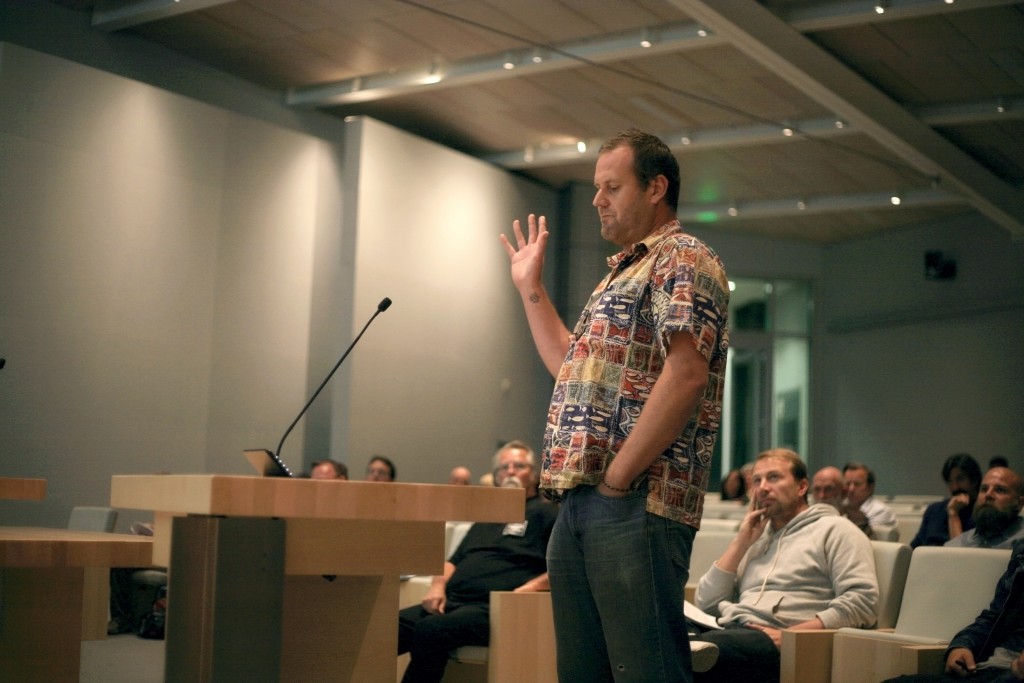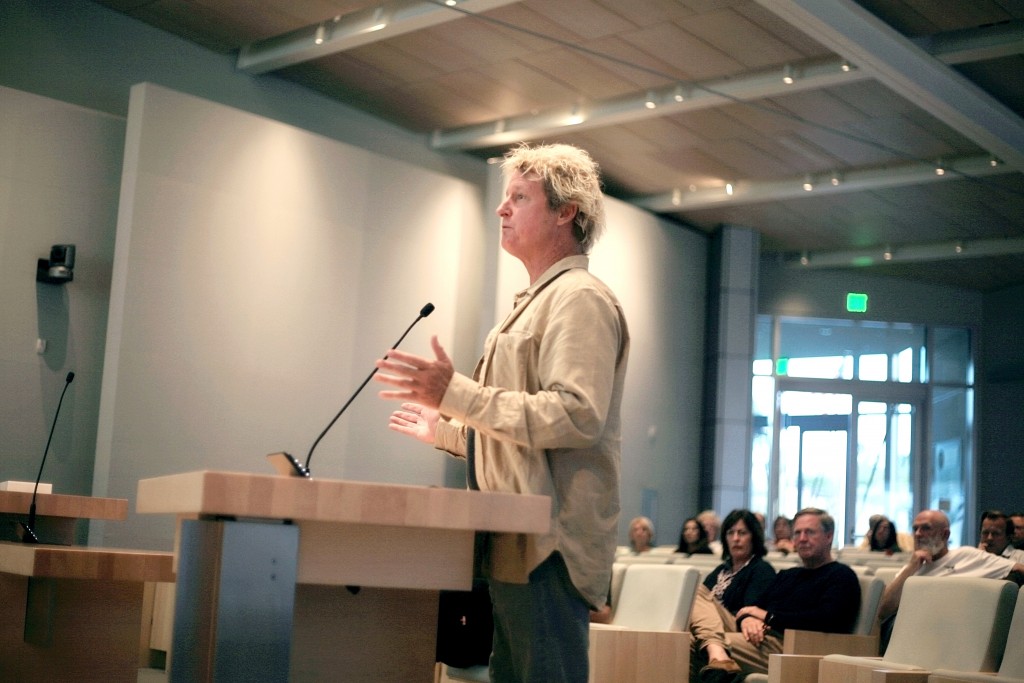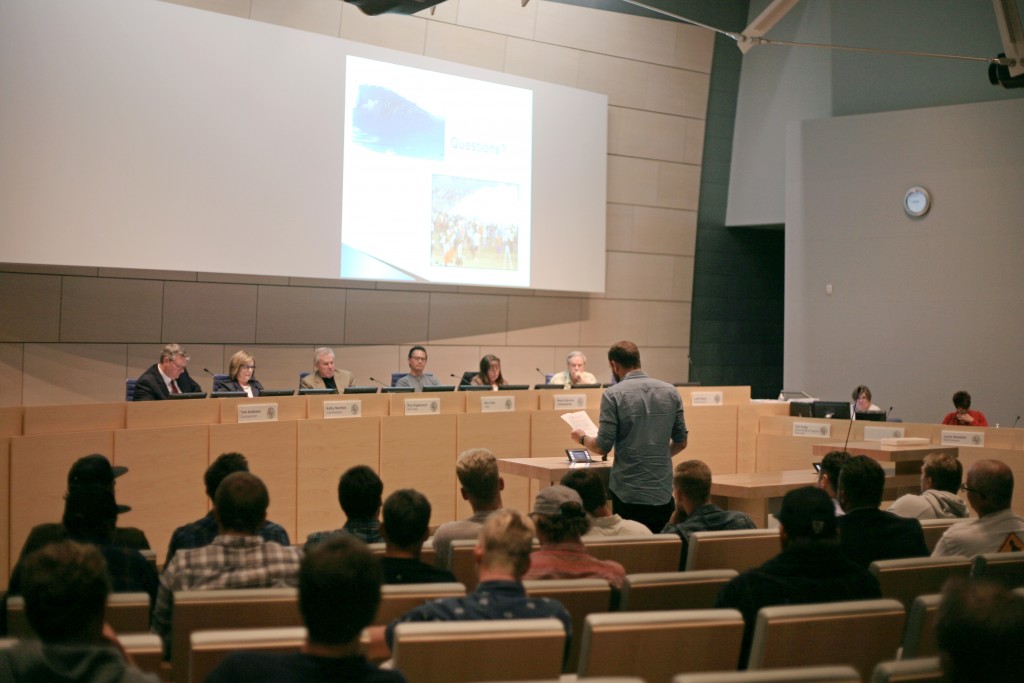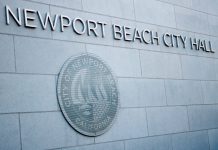
— Photo by Sara Hall ©
Officials voted to recommend reducing blackball hours along a small, but popular stretch of water on the Balboa Peninsula following a passionate discussion this week.
After about three hours, nearly 50 public comments on two separate items, and several split votes, the Parks, Beaches and Recreation Commission on Tuesday approved several proposals to recommend to the Newport Beach City Council regarding blackball, including reducing hours between 40th and 44th streets.
Blackball at the Wedge will remain the same.
A blackball flag, characterized by the black circle surrounded by a yellow background, means that hard surfboards are not allowed in the break when the flag is displayed, according to Surfline. It’s meant to protect swimmers and others from the hard boards when there is heavy traffic in the water.
“This is a tough issue,” said PBR Chairman Ron Cole. “There are a lot of different users out there that would like to have access.”
The discussion and PBR’s recommendations will now move on to the city council’s agenda.
Commissioners will recommend three changes to council.
The first will allow that year-round and citywide, the supervising Marine Operations Watch Commander, or designee, has the authority to blackball when an unsafe condition exists between, but not limited to hard board surfers, skim boarders, other floatation device users and other ocean water users (swimmers).
The second proposes adjusting the distances of surfing area three in Little Corona to be defined by the area of ocean between the prolongations of Poppy Avenue and Cameo Shores Road.
The third, and most controversial of the night, includes prohibiting surfing in the area between the midline of the rock groins located on the prolongation of 40th Street and 44th Street from 10 a.m. to 5 p.m. daily from the Saturday before Memorial Day through Labor Day.
Accept the recommendations, as is, with the provision that number three is monitored for a full summer after council approval
The commission approved it 5-1, with Commissioner Roy Englebrecht dissenting.
They also considered blackball rules at the Wedge.
Staff recommended adjusting the location defining the area known as the Wedge to 20 feet from the west jetty of the Newport Harbor entrance channel to 600 feet northwest along the mean high tideline.
This was unanimously approved as written.
Staff also suggested modifying regulations at the Wedge with blackball from 10 a.m. to 5 p.m. from the Saturday before Memorial Day through Labor Day.
After several split votes the proposal to modify the hours failed on its merits. Commissioners Tom Anderson, Walt Howald and Englebrecht voted to deny the recommendation and keep the rules the same, while commissioners Kathy Hamilton, Marie Marston, and Cole, voted to approve the recommendation.

— Photo by Sara Hall ©
Members of the public were outspoken on both sides of the issue.
“The surf, the waves are a limited resource with an unlimited demand,” said West Newport local Doug Collier. It’s impossible to allocate the waves to all the people that want them, he added.
Many speakers emphasized safety.
“Can we (body surfers) go out with the surfers? Yeah, we can. But we’re going to lose every time,” said longtime Newport Shores resident and body surfer, Kevin Murphy. “The surfers dominate the water.”
“The Wedge is an institution in the body surfing world,” said Sean Starkey, who was injured recently by a surfer’s leash after he lost control of his board. The leash tore a gash through his wetsuit on his leg. He required six stitches and has been out of the water since.
“We have no way to protect ourselves in the water, it’s just our bodies,” he added. “Please think about our safety.”
The lifeguards are not enforcing the laws, he added.
Other public speakers agreed, raising concern with several commissioners.
“There is no doubt that enforcement, to me, is absolutely critical,” Englebrecht said.
There are a more altercations happening in the water and on the beach, he continued, and it won’t be long until something serious happens that will embarrass the city and hurt innocent people.
“Until we have recommendations and procedures on how to enforce blackball, we don’t need to change anything,” he added.
Staffing depends on the conditions of the day and time of year, Williams noted.
Lifeguard supervisors with many years of experience are making the decisions about enforcing blackball, Halphide added, not “high school kids.”
“We have to rely a great deal upon the fire department, the lifeguards, our personnel, in order to make something like this work and provide the safety for all the beaches,” Howald said.
There has to be a win-win compromise, Murphy said, but this isn’t it.
Speakers also noted inexperienced surfers, early mornings, teens making the decisions, a surfing-only area, enforcement, safety, and more.
Many members of the public urged commissioners to keep the blackball rules the same.
Several commissioners agreed when it came to blackball at the Wedge.
“The Wedge is a different place,” Anderson said. “It’s one of the most unique places I know of in the world with unique problems and unique challenges.”
He remains unmoved to change anything, Anderson noted.
“The body surfing folks out there are the most vulnerable in what only can be, in my opinion, described as a washing machine,” Anderson said.
The Wedge is one of the top three body surfing destinations around the globe, Englebrecht said.
“As I see it there is not a reason under God’s green earth that we should change anything and I’m shocked why this recommendation was even brought to this commission,” he said to some applause.
“The Wedge is a world class wave for all groups,” said skim boarder Aaron Peluso, including body surfing, skim boarding, body boarding and surfing. “What you have to deal with here is you have to figure out how to split that up and create a fair use for everyone. And that’s a difficult task.”

— Photo by Sara Hall ©




